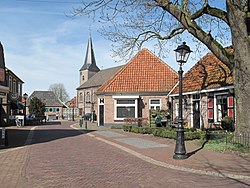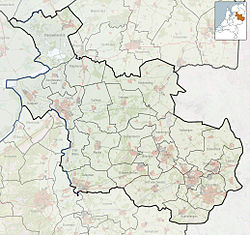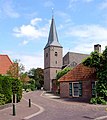
Overijssel is a province of the Netherlands located in the eastern part of the country. The province's name translates to "across the IJssel", from the perspective of the Episcopal principality of Utrecht by which it was held until 1528. The capital city of Overijssel is Zwolle and the largest city is Enschede. The province had a population of about 1,184,000 as of January 2023. The land mostly consists of grasslands and some forests ; it also borders a small part of the IJsselmeer to the west.

Zwolle is a city and municipality in the Northeastern Netherlands. It is the capital of the province of Overijssel and the province's second-largest municipality, after Enschede, and has a population of 132.441 as of December 2023. Zwolle borders the province of Gelderland and lies on the eastern side of the River IJssel.

Kampen is a city and municipality in the province of Overijssel, Netherlands. A member of the former Hanseatic League, it is located at the lower reaches of the river IJssel.

Ommen is a municipality and a Hanseatic city in the eastern Netherlands. It is located in the Vecht valley of the Salland region in Overijssel. Historical records first name Ommen in the early 12th century and it was officially founded as a city in 1248. The municipality had a population of 18,295 in 2021 and covers an area of 182.01 km2 (70.27 sq mi).
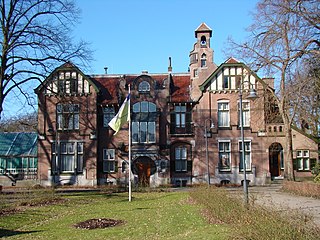
Steenwijkerland is a municipality in the province of Overijssel, in the eastern Netherlands. Prior to a name change in 2003, it was known as Steenwijk.

Otto of Lippe was a son of Bernhard II, Lord of Lippe. He was bishop of Utrecht as Otto II from 1216 to 1227. Several of his brothers also held high ecclesiastical offices in the Rhineland. He likely participated in the foundation of the Teutonic Order.

Diepenheim is a small city in the Dutch province of Overijssel. It is located in the municipality of Hof van Twente, about 5 km southwest of Goor. Diepenheim was a separate municipality until 2001, when it became a part of Hof van Twente.

Linschoten is a village in the Dutch province of Utrecht. It is a part of the municipality of Montfoort, and lies about 3 km southeast of Woerden.

Maarsbergen is a settlement in the Dutch province of Utrecht. It is a part of the municipality of Utrechtse Heuvelrug, and lies about 18 km east of Utrecht.
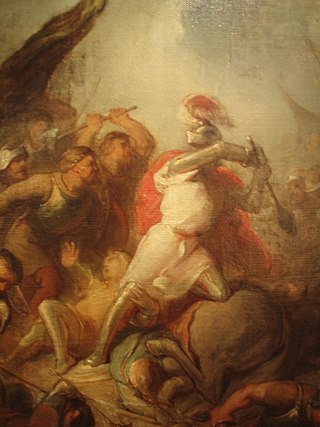
The Battle of Ane, was fought in 1227 between Otto II of Lippe, Bishop of Utrecht, and Rudolf II van Coevorden with his army of Drenths. The account of the battle comes from Quedam narracio de Groninghe de Trentis de Covordia et diversis aliis sub episcopis traiectensibus, a manuscript from the early 13th century.

Kuinre is a village in the Dutch province of Overijssel. It was a separate municipality until 1973, when it became a part of IJsselham, which in turn merged into the municipality of Steenwijkerland in 2001.

Ane is a village in the Dutch province of Overijssel. It is located in the municipality Hardenberg, about 5 km northeast of the centre of Hardenberg.

Anevelde is a hamlet in the Dutch province of Overijssel. It is located in the municipality Hardenberg, about 3 km northeast of the centre of Hardenberg.

Zwolle is the main railway station of Zwolle in Overijssel, Netherlands. The station opened on 6 June 1864 and is on the Utrecht–Kampen railway, also known as the Centraalspoorweg, the Zwolle–Almelo railway, the Arnhem–Leeuwarden railway, the Zwolle–Stadskanaal railway and the Lelystad–Zwolle railway, also known as the Hanzelijn.
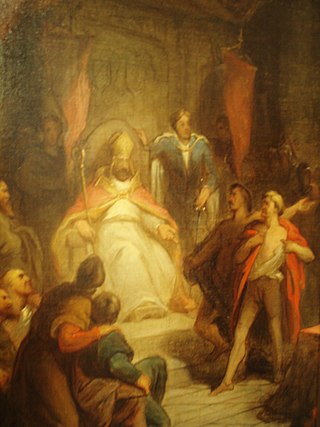
Wilbrand of Oldenburg was a bishop of Paderborn and of Utrecht.

Hardenberg is a city and municipality in the province of Overijssel, Eastern Netherlands. The municipality of Hardenberg has a population of about 60,000, with about 19,000 living in the city. It received city rights in 1362 from Jan van Arkel, Bishop of Utrecht. The famous Pieterpad passes through Hardenberg, a municipality which is located on the German border. A sizable portion of the population speaks Dutch Low Saxon as a native language.
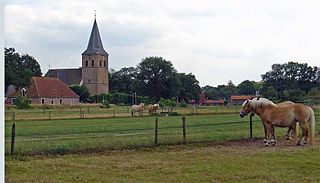
Heemse is a neighbourhood of Hardenberg and former village in the Dutch province of Overijssel. In 1966, it was annexed by Hardenberg.

De Krim is a village in the municipality of Hardenberg part of the province of Overijssel, Netherlands. The village started as a peat excavation village.
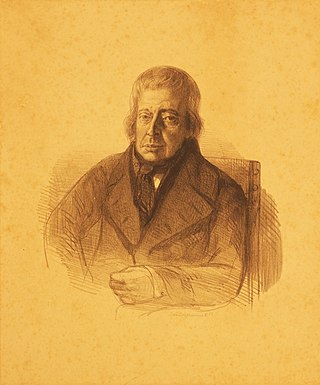
Willem Jan, Baron van Dedem tot de Rollecate was a Dutch lawyer, landowner and taxation officer who was responsible for the peat excavation in south-east Drenthe and north-east Overijssel. The canal and town of Dedemsvaart are named after van Dedem.

Lutten is a village in the Dutch province of Overijssel. It is located in the municipality Hardenberg, about 13 kilometres (8.1 mi) south-west of Coevorden.
